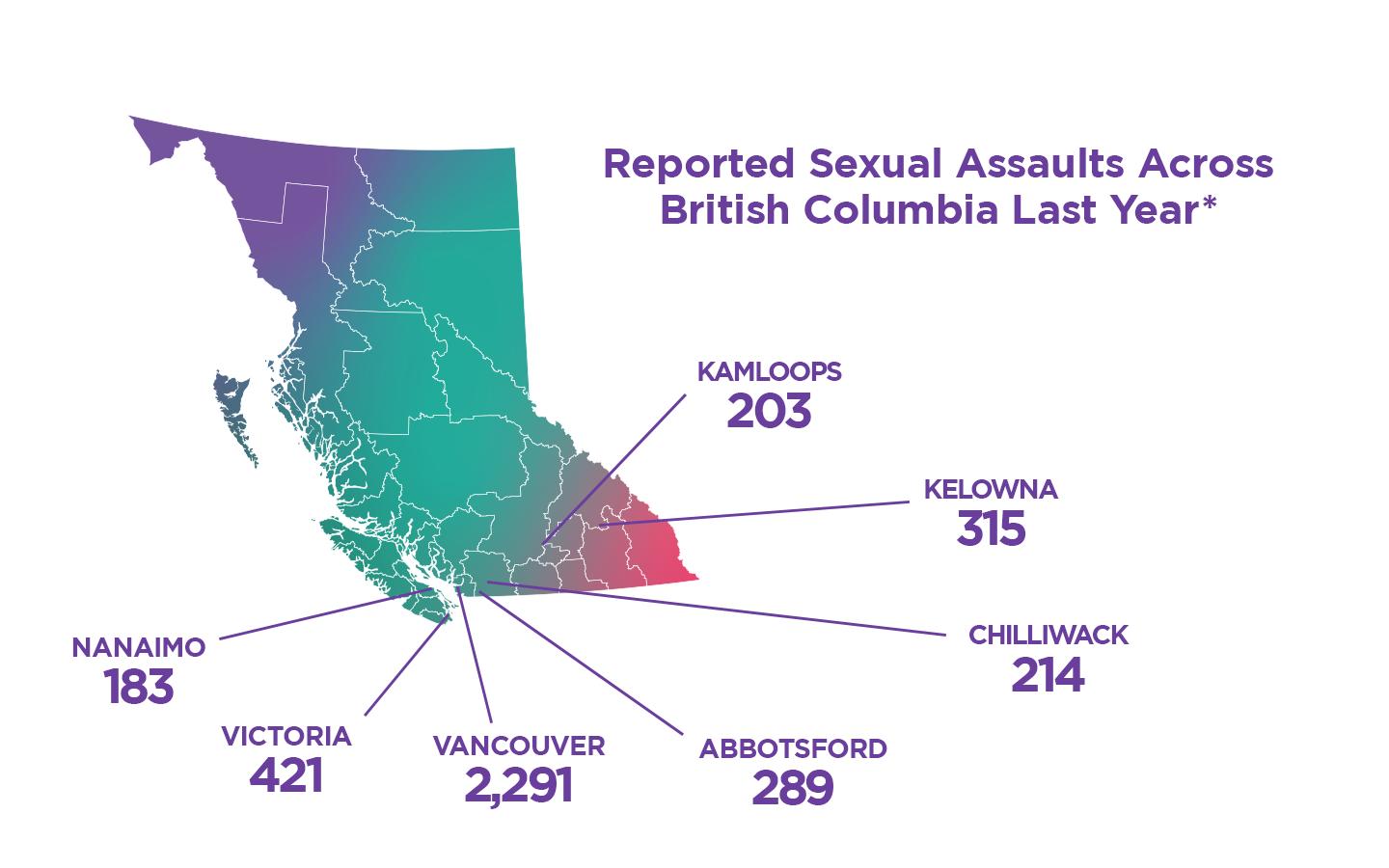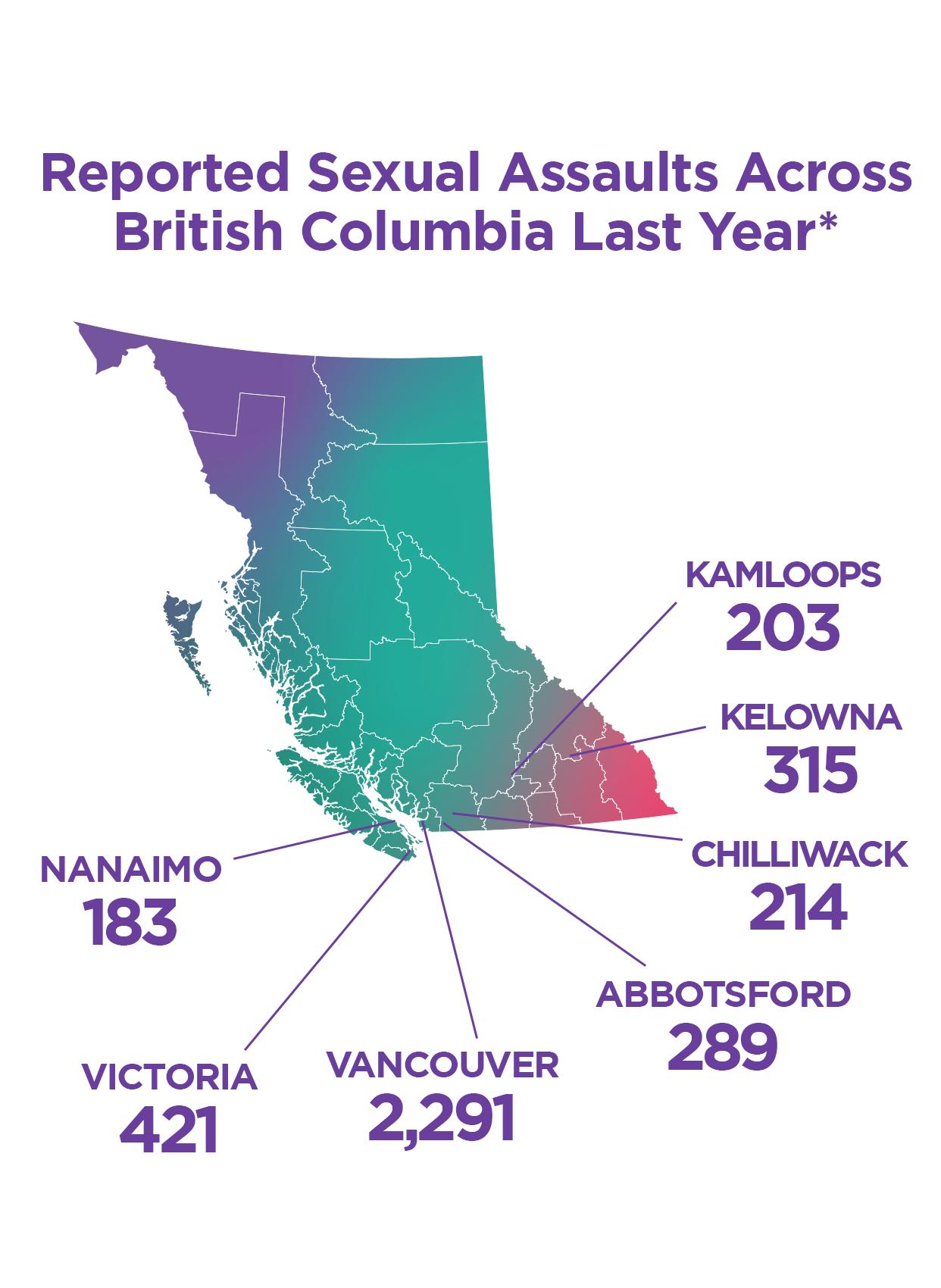Add your voice to declare gender-based violence an epidemic.


Statistics Canada. Table 35-10-0177-01; Incident-based crime statistics, by detailed violations, Canada, provinces, territories, Census Metropolitan Areas, and Canadian Forces Military Police.
Data from the listed violations in the year 2023 were tabulated to calculate the total incidents of sexual assaults, including: Sexual assault, level 3, aggravated [1310], Sexual assault, level 2, weapon or bodily harm [1320], Sexual assault, level 1 [1330], Sexual interference [1345]27, 28, Invitation to sexual touching [1350]27, 28, Sexual exploitation [1355]27, 28, Agreement or Arrangement - sexual offence against child [1371]29, Other sexual violations [1340], Sexual Exploitation of a person with a disability [1356], Non-consensual distribution of intimate images [1390]30, Sexual offences, public morals, and disorderly conduct (Part V Criminal Code) [3740].
The numbers you see are just the beginning. Sexual assault is the most underreported crime in Canada. Only 6% of sexual assaults are reported to police, making it the most underreported crime measured in the General Social Survey on Victimization 1. This startling statistic underscores the significant gap between what is reported and the true prevalence of sexual violence in our communities. It also highlights the urgent need to reduce stigma, encourage reporting and push for systemic changes to better address and prevent gender-based violence.
1. Adam Cotter, Canadian Centre for Justice and Community Safety Statistics, Statistics Canada, 2019
For its Close to Home campaign, YWCA Metro Vancouver focused on reported sexual assaults, sourced from Statistics Canada, the Vancouver Police Department and the RCMP. Unfortunately, finding comprehensive data on gender-based violence as a whole is incredibly difficult and often unreliable. One of our campaign calls is for increased data collection on this pervasive and life-threatening issue, including through a coroner’s review of related deaths by gender-based violence.
Gender-Based Violence at a Glance
- Nearly one-in-two women in BC (48%) has experienced some form of intimate partner violence since age 15. Nearly 30% have experienced physical or sexual violence, specifically (Statistics Canada)
- A woman or girl is killed in Canada every 48 hours in Canada (Canadian Femicide Observatory for Justice and Accountability)
- Women living in Canada are almost four times more likely than men to have been sexually assaulted at least once since the age of 15, according to self-reported data (Government of Canada)
Support and Resources
If you or someone you know is facing gender-based violence, help is available. If you are in immediate danger or serious injury, call 911. Here are some trusted resources for support, guidance and safety.
What is Gender-Based Violence?
Gender-based violence is any act of violence centred on a person’s gender, gender expression, gender identity or perceived gender. It includes all forms of gendered violence, both within and outside of intimate relationships. It can include emotional, physical, financial and all forms of sexual violence, sexual harassment and online gendered harassment. Anyone can experience gender-based violence, but women, girls, and gender-diverse individuals—especially those who are Indigenous, Black, or racialized—are at far greater risk.
Why Should BC Declare an Epidemic?
Gender-based violence can have significant health impacts, including physical injuries, sexually transmitted infections, unintended pregnancies, depression, PTSD, anxiety, chronic headaches and gastrointestinal disorders. Violence and related trauma can also lead to people losing their homes, their jobs and their support systems. In other words, the impacts of gender-based violence are far-reaching and can last generations.
Acknowledging gender-based violence as an epidemic is a critical step in recognizing its severity and coordinating efforts to address its root causes. Declaring an epidemic could result in increased public awareness, better data collection and research, increased diagnosis and prevention, and long-term behavioural changes.
Who Else Has Declared an Epidemic?
- Nova Scotia
- More than 90 municipalities in Ontario such as Toronto, Mississauga, Hamilton, London and Kingston
- Ontario is considering its own bill to declare an epidemic province wide
Hon. David Eby, Premier of British Columbia
Office of the Premier
Legislative Assembly of British Columbia
501 Belleville St., Victoria, BC V8V 1X4
By email: premier@gov.bc.ca
RE: Declare Gender-based Violence an Epidemic in British Columbia
Dear Premier Eby,
We are writing today as advocates, experts and concerned service providers who support survivors of gender-based violence.
In your election platform, you highlighted the importance of making BC safer and more inclusive for women, girls and 2SLGBTQIA+ people. As you form a new government, you have the opportunity to acknowledge the severity of gender-based violence and commit to preventing it. Declaring gender-based violence an epidemic would be a monumental step toward recognizing it as a health and social issue that warrants a significant and meaningful response.
Gender-based violence is pervasive in our province, with nearly 30% of women experiencing physical or sexual intimate partner violence, according to Statistics Canada. That figure is much higher for Indigenous women in BC, reaching 42%. Even with those statistics, we know gender-based violence continues to be an underreported crime due to its complexity and stigma.
Across Canada, at least one woman or girl is killed every two days, according to the Canadian Femicide Observatory for Justice and Accountability (CFOJA). Even so, femicide—which the UN describes as an intentional killing with a gender-related motivation—is not part of Canada’s criminal code. Data from CFOJA shows there were 21 femicides in BC in 2023. The year before that, 24 women were killed. But even one gender-motivated death is too many.
As service providers and advocates, we see firsthand just how many women, gender diverse people and their children experience violence. Many of our organizations have hundreds of women and children on our shelter and transition housing waitlists, as families fleeing violence search for a safe place to live. Support for the sector is more crucial than ever, and more action needs to be taken.
Declaring gender-based violence an epidemic will lead to increased public awareness, but more than that, it will demonstrate to survivors that your government recognizes the frequency and severity of the problem and is committed to taking steps towards its prevention.
Declaring gender-based violence an epidemic also acknowledges this critical issue requires a whole of society response. The negative effects of gender-based violence reach far beyond the individuals who directly experience them; it can have long-lasting and negative health, social and economic effects that span generations.
We know the provincial government has taken steps through Safe and Supported: BC’s Gender-Based Violence Action Plan and by appointing Kim Stanton to review the treatment of sexual violence and intimate partner violence in the province’s legal system. And nearly two years ago, Dr. Bonnie Henry identified eliminating gender-based violence as a “public health priority.” It’s now time to take that one step further.
To address the urgency of this issue, we ask that you include a declaration of gender-based violence as an epidemic in your upcoming ministry mandate letters. We know that governments and policymakers can have a lasting impact by choosing to invest in violence prevention, early intervention and survivor support services. As a coalition of advocates, experts and concerned service providers, we will present to your government additional recommendations for action to address gender-based violence. We invite you to meet with us to discuss this issue in greater detail and to review the attached backgrounder.
By taking bold action today and declaring gender-based violence an epidemic, your government will demonstrate its commitment to improving the safety, health and overall well-being of women and gender-diverse people in our province. We urge you to make this vital commitment.
Sincerely,
Erin Seeley, CEO, YWCA Metro Vancouver
In collaboration with the following individuals and organizations:
Alliance of BC Students
AMS Sexual Assault Support Centre
Allison Mclauchlan, Executive Director, Kamloops & District Elizabeth Fry Society
Amy S. FitzGerald, Executive Director, BC Society of Transition Houses
Andrea Reimer, former Vancouver City Councillor, Adjunct Professor, UBC School of Public Policy and Global Affairs and Founder & Principal, Tawaw Strategies
Ange Valentini, Government Relations Professional, Strategist and Community Organizer
Ashley Oakes, Executive Director, PearlSpace
British Columbia Federation of Students
Chantelle Krish, CEO, Big Sisters of BC Lower Mainland
Chantelle Spicer, Campaign Manager, BC Poverty Reduction Coalition
Dalya Israel, Executive Director, Salal Sexual Violence Support Centre
Donne Rosa, CEO, Atira Women’s Resource Society
Graduate Student Society - UBC Vancouver
Heidi Worthington, CEO, YMCA BC
Isabelle Easton, University of Victoria Students' Society Director of Campaigns and Community Relations
Jessica L. Jimmo, Access BC
Jessie Kaur Lehail, Chapter Director, Shelter Movers – Vancouver and CEO, Kaur Collective Foundation
Karen Mason, Supporting Survivors of Abuse and Brain Injury Through Research (SOAR)
Katrina Chen, former BC MLA/Minister - now President of 安信 Community Savings and Author of A Stronger Home dedicated to raising awareness on family violence
Micki Materi, Co-Executive Director of Programs, Archway Society for Domestic Peace
Mira Oreck, Executive Director, The Houssian Foundation
Ninu Kang, Ending Violence Association of BC (EVA BC)
Rosa Elena Arteaga, Director, Clinical Practice and Direct Service at BWSS Battered Women’s Support Services Association
Rowan Burdge, Executive Director, BC Poverty Reduction Coalition
Raji Mangat, Executive Director, West Coast LEAF
Sarah McIntosh, Chief Operating Officer, Atira Women’s Resource Society
Sherry Demetrick, Co-Executive Director of Administration, Archway Society for Domestic Peace
Surrey Women’s Centre
Students’ Union Okanagan of UBC
The Alma Mater Society at the University of British Columbia Vancouver
The Cridge Centre for the Family
The Moose Hide Campaign
Tracey Ramsey, Sybil Joseph and Brenda Mason, Unifor Women’s Department and Unifor BC Regional Women’s Committee
Vicky Bungay, PhD RN, FCAN, Professor and Canada Research Chair in Gender Equity and Community Engagement and Scientific Director: Capacity, the Centre for Research in Community Engagement and Gender Equity, University of British Columbia
Vicky Law, Executive Director, Rise Women’s Legal Centre

